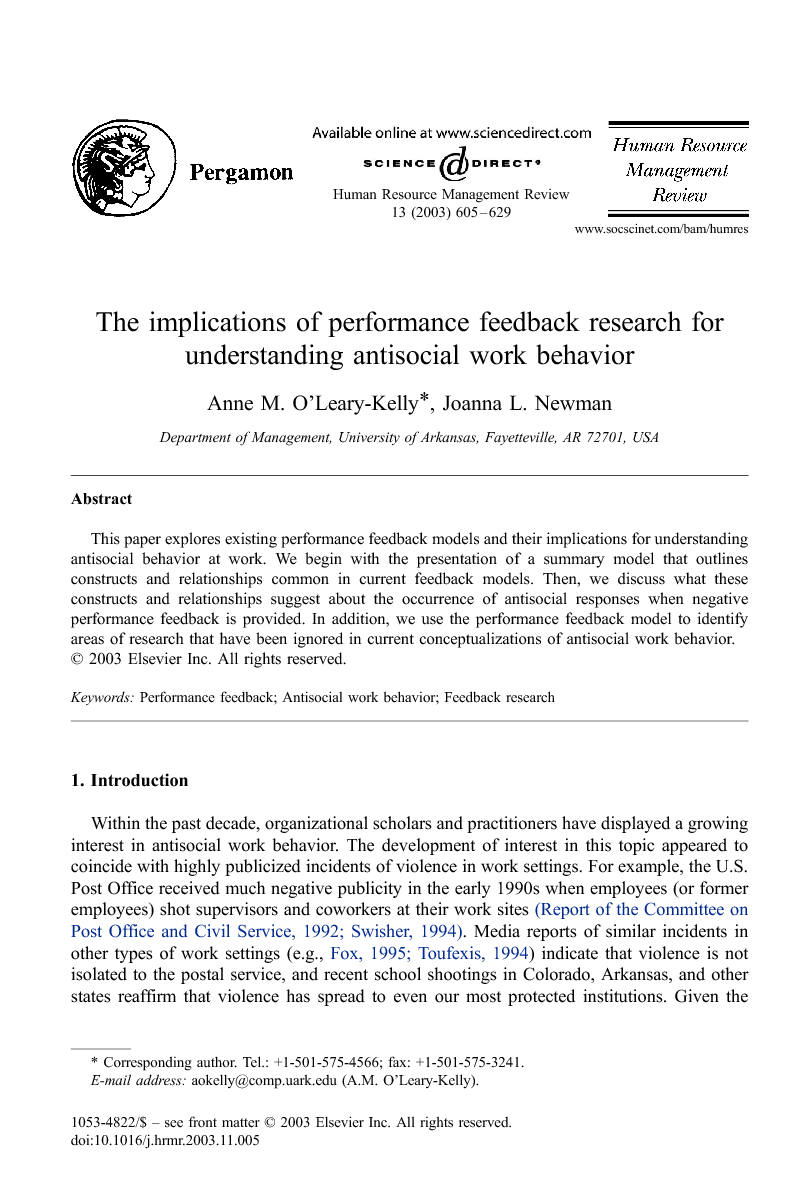This paper explores existing performance feedback models and their implications for understanding antisocial behavior at work. We begin with the presentation of a summary model that outlines constructs and relationships common in current feedback models. Then, we discuss what these constructs and relationships suggest about the occurrence of antisocial responses when negative performance feedback is provided. In addition, we use the performance feedback model to identify areas of research that have been ignored in current conceptualizations of antisocial work behavior.
Within the past decade, organizational scholars and practitioners have displayed a growing interest in antisocial work behavior. The development of interest in this topic appeared to coincide with highly publicized incidents of violence in work settings. For example, the U.S. Post Office received much negative publicity in the early 1990s when employees (or former employees) shot supervisors and coworkers at their work sites Report of the Committee on Post Office and Civil Service, 1992 and Swisher, 1994. Media reports of similar incidents in other types of work settings (e.g., Fox, 1995 and Toufexis, 1994) indicate that violence is not isolated to the postal service, and recent school shootings in Colorado, Arkansas, and other states reaffirm that violence has spread to even our most protected institutions. Given the dizzying pace with which Americans are confronted by the issue of violence in organizational settings, additional discussion of this important issue is warranted.
Research on antisocial work behavior has benefited greatly from existing theoretical frameworks in both social psychology and the organizational sciences. For example, O'Leary-Kelly, Griffin, and Glew (1996) applied social learning theory (Bandura, 1973) to the issue of aggressive work behavior, suggesting factors in a work environment that might prompt aggression. Additionally, several authors (e.g., Bies & Tripp, 1998, Greenberg, 1998, Greenberg & Alge, 1998, Skarlicki & Folger, 1997 and Skarlicki et al., 1999) have adopted a justice-based framework, suggesting that behaviors such as retaliation, revenge, and theft are motivated by perceived unfair treatment.
Interestingly, the research on antisocial work behavior has not been well integrated with research on another relevant topic—the provision of performance feedback information. In fact, there is little research that explores aggressive behavior as a reaction to negative feedback. This is surprising because many of the publicized incidents of workplace violence that captured the attention of researchers, practitioners and the general public involved situations where employees reacted aggressively to negative feedback from work-related sources (e.g., Fox, 1995 and Toufexis, 1994). The purpose of this paper is to examine how existing research on the provision of feedback information might inform us about antisocial work behavior. Specifically, we use feedback research to identify issues that are relevant to the prediction of antisocial work behavior, but which have not been addressed in research to date. We begin by defining our terms and setting boundaries around our discussion. We then describe a model that summarizes basic characteristics of existing research on work-related performance feedback. Finally, we use this model to frame our discussion of antisocial work behavior.


